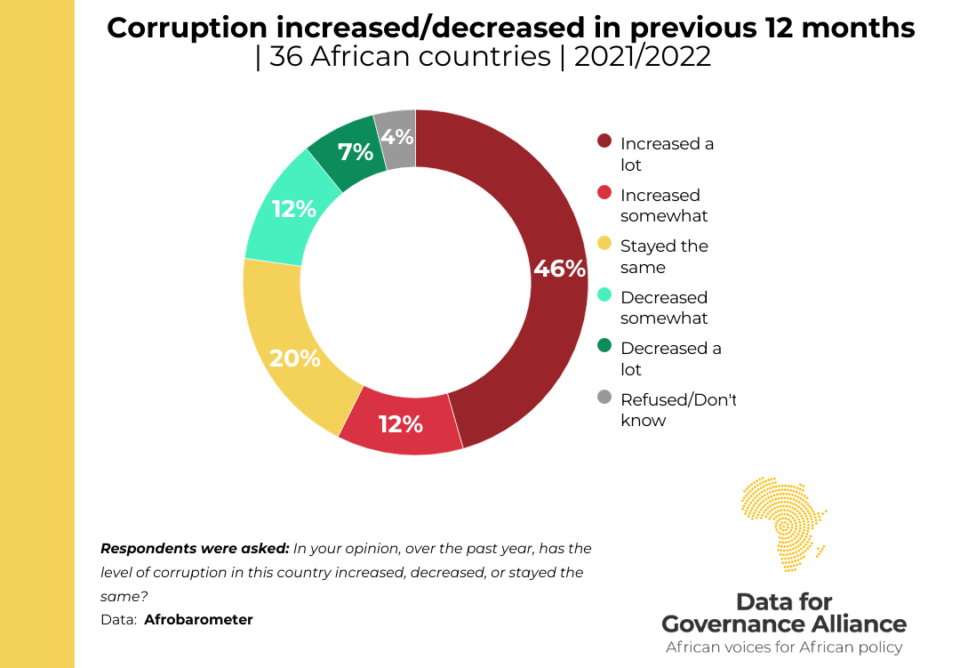Latest Afrobarometer Study Shows
A majority of Africans say that corruption has increased in their countries, but an even larger proportion fear retaliation should they report corrupt acts to the authorities.
Maame Akua Amoah Twum, Afrobarometer communications coordinator for anglophone
West and North Africa, shared these insights at a webinar on corruption organised by the
Data for Governance Alliance, in collaboration with the African Union Advisory Board Against Corruption. Themed “Civil society organisations’ contribution to driving accountability in the fight against corruption in Africa,” the webinar brought together experts, policy makers, and civil society actors to reflect on the prevalence of corruption on the continent, its impacts, and innovative strategies for effectively combating it.
Sharing findings from Afrobarometer surveys in 36 African countries in 2021/2022, Twum said almost six in 10 Africans (58%) say that corruption in their countries increased over the past year. The situation has worsened significantly in 12 of the 30 countries surveyed in both 2014/2015 and 2021/2022, most dramatically in Senegal (where perceptions of increasing corruption have risen by 39 percentage points), Burkina Faso (+29 points), Gabon (+24 points), Cameroon (+23 points), and Côte d’Ivoire (+22 points). On the other hand, there has been a drastic improvement in Benin, where the proportion who report that corruption increased dropped by -61 percentage points.
“The survey findings highlight the urgent need for African governments to prioritise anticorruption efforts and regain public trust. It is crucial to establish robust mechanisms for citizen engagement, protect whistleblowers, and build accountable institutions that actively work toward eradicating corruption,” she said. “However, seven in 10 Africans say ordinary citizens risk retaliation or other negative consequences if they report corruption to the authorities.”
Other speakers emphasised the importance of concerted efforts on the part of civil society organisations (CSOs), the media, and other stakeholders to combat corruption on the continent.
Edem Senanu, a member of the African Union Advisory Board Against Corruption, highlighted strides the board has made in its anti-corruption efforts with member states.
“Many state parties have put in place institutions such as anti-corruption agencies, financial intelligence units, asset recovery agencies, and anti-corruption units within law enforcement agencies,” he said. “With the regional economic communities’ role in promoting the fight against corruption and the implementation of the African Union Convention on Preventing and Combating Corruption, more synergies and collaboration will reduce corruption on the continent.”
Don Deya, chief executive officer of the Pan African Lawyers Union (PALU), challenged CSOs to take the fight against corruption farther through social movements.
“While ‘NGO-style’ activism is necessary, it is not sufficient,” he said. “Let’s think more radically. Let’s also be more political, and use an anti-corruption lens to assess political candidates and political parties, especially during election periods.”
Paul Banoba, Africa adviser at Transparency International, highlighted the importance of data in informing policy and advocacy efforts.
“Our focus as a network is to use data to inform planning policy uptake and advocacy in Africa,” he said. “It comes from a background that our work as civil society in Africa is mostly done without an informed basis.”
Shedding light on the role of the media in the fight against corruption, Kojo Pumpuni, director of advocacy and policy engagement at the Center for Democratic Development, said, “Immediate and persistent effort in the media is required to amplify corruption and receive a response from the government.”
The webinar was organised as a precursor to the 20th anniversary of the adoption of the African Union Convention on Preventing and Combating Corruption (AUCPCC), which will be celebrated on 11 July 2023 in Arusha, Tanzania.
About Data for Governance Alliance
The Data for Governance Alliance is a four-year project that promotes data-based advocacy and engagement by pan-African civil society organisations (CSOs) and African Union organs. The project is led by Afrobarometer, with partners including the Ghana Center for Democratic Development, the Institute for Development Studies at the University of Nairobi, the Institute for Justice and Reconciliation, and Laws.Africa. The project is funded by the European Union.

